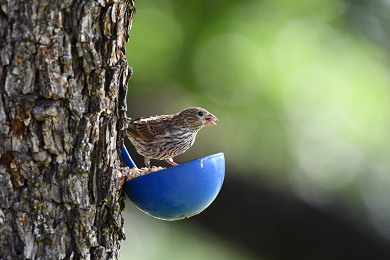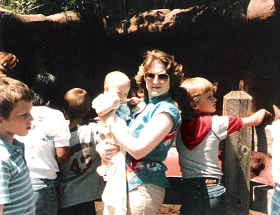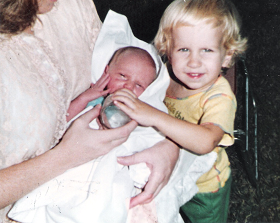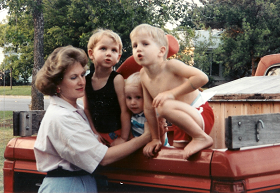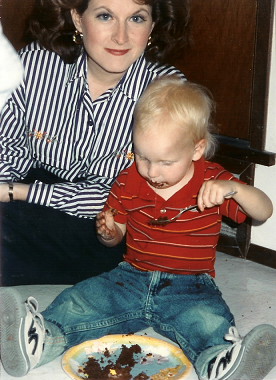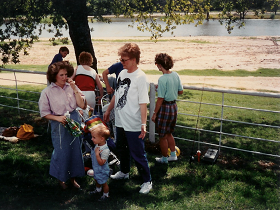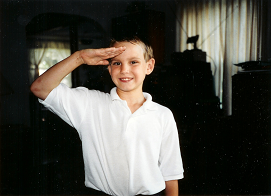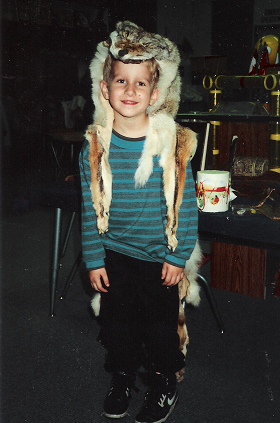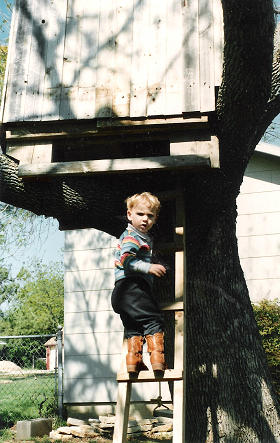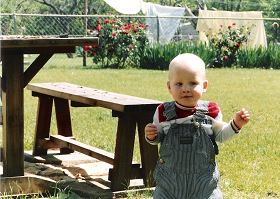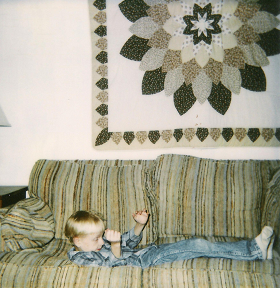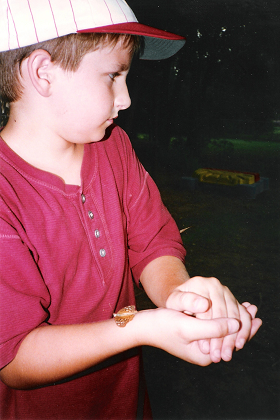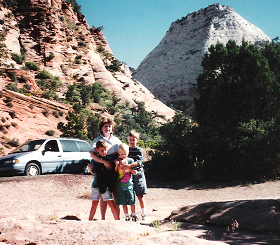
And when and where do you think we find the children next? No longer in the wintertime, but in the merry month of May. No longer in Tanglewood playroom or at Tanglewood fireside, but more than halfway up a monstrous hill, or a mountain, as perhaps it would be better pleased to have us call it. They had set out from home with the mighty purpose of climbing this high hill even to the very tiptop of its bald head. To be sure, it was not quite so high as Chimbarozo or Mont Blanc, and was even a good deal lower than old Graylock. But, at any rate, it was higher than a thousand ant-hillocks or a million of molehills, and when measured by the short strides of little children might be reckoned a very respectable mountain.
And was Cousin Eustace with the party? Of that you may be certain, else how could the book go on a step further? He was now in the middle of the spring vacation and looked pretty much as we saw him four or five months ago, except that if you gazed quite closely at his upper lip you could discern the funniest little bit of a mustache upon it. Setting aside this mark of mature manhood, you might have considered Cousin Eustace just as much a boy as when you first became acquainted with him. He was as merry, as playful, as good-humored, as light of foot and of spirits, and equally a favorite with the little folks as he had always been. This expedition up the mountain was entirely of his contrivance. All the way up the steep ascent he had encouraged the elder children with his cheerful voice, and when Dandelion, Cowslip, and Squash-blossom grew weary he had lugged them along, alternately, on his back. In this manner they had passed through the orchards and pastures on the lower part of the hill, and had reached the wood which extends thence toward its bare summit.
The month of May thus far had been more amiable than it often is, and this was as sweet and genial a day as the heart of man or child could wish. In their progress up the hill the small people had found enough of violets, blue and white, and some that were as golden as if they had the touch of Midas on them. That sociablest of flowers, the little Housatonia, was very abundant. It is a flower that never lives alone, but which loves its own kind, and is always fond of dwelling with a great many friends and relatives around it. Sometimes you see a family of them covering a space no bigger than the palm of your hand, and sometimes a large community whitening a whole tract of pasture and all keeping one another in cheerful heart and life.
Within the verge of the wood there were columbines, looking more pale than red, be cause they were so modest, and had thought proper to seclude themselves too anxiously from the sun. There were wild geraniums, too, and a thousand white blossoms of the strawberry. The trailing arbutus was not yet quite out of bloom, but it hid its precious flowers under the last year’s withered forest leaves as carefully as a mother-bird hides its little young ones. It knew, I suppose, how beautiful and sweet-scented they were. So cunning was their concealment that the children sometimes smelled the delicate richness of their perfume before they knew whence it proceeded.
Amid so much new life it was strange and truly pitiful to behold here and there, in the fields and pastures, the hoary periwigs of dandelions that had already gone to seed. They had done with summer before the summer came. Within those small globes of winged seeds it was autumn now.
Well, but we must not waste our valuable pages with any more talk about the springtime and wild flowers. There is something, we hope, more interesting to be talked about. If you look at the group of children, you may see them all gathered around Eustace Bright, who, sitting on the stump of a tree, seems to be just beginning a story. The fact is, the younger part of the troop have found out that it takes rather too many of their short strides to measure the long ascent of the hill. Cousin Eustace, therefore, has decided to leave Sweet Fern, Cowslip, Squash-blossom, and Dandelion at this point, midway up, until the return of the rest of the party from the summit. And because they complain a little and do not quite like to stay behind, he gives them some apples out of his pocket and proposes to tell them a very pretty story. Hereupon they brighten up and change their grieved looks into the broadest kind of smiles.
As for the story, I was there to hear it, hidden behind a bush, and shall tell it over to you in the pages that come next.

And Elijah said unto her: Fear not, but go and do as thou hast said: but make me thereof a little cake first of all; and bring it out to me: and afterward make for thee and thy son. For thus saith the Lord God of Israel: the pitcher of Meal shall not be wasted neither shall thy oil cruse be without oil, until the Lord have sent rain upon the earth. And she went and did as Elijah bade. And she and he & her house did eat a good space & the pitcher of meal wasted not neither was the oil cruse without oil according to the word of the Lord which he spoke through Elijah. (i Kings 17)


Game
Summary
For a long string of years the opposing team won all of the club’s all star games. Until one year the long sought after win finally came. In the first game our team took a shellacking, then hung on to make it to the last game of the elimination. There they faced that same team that they lost to so badly in the first round and this time were victorious. (There was a small but significant variable, though I won’t elaborate on it, that I think made just the right difference to disrupt the concentration of the opposing team and turn things around enough to break their resolve and make the win possible)



One evening in times long ago old Philemon and his old wife Baucis sat at their cottage door enjoying the calm and beautiful sunset. They had already eaten their frugal supper, and intended now to spend a quiet hour or two before bedtime. So they talked about their garden and their cow and their bees and their grapevine which clambered over the cottage wall, and on which the grapes were beginning to turn purple. But the rude shouts of children and the fierce barking of dogs in the village near at hand grew louder and louder, until at last it was hardly possible for Baucis and Philemon to hear each other speak.
“Ah, wife,” cried Philemon, “I fear some poor traveler is seeking hospitality among our neighbors yonder, and instead of giving him food and lodging they have set their dogs at him, as their custom is!”
“Well-a-day!” answered old Baucis; “I do wish our neighbors felt a little more kindness for their fellow-creatures. And only think of bringing up their children in this naughty way, and patting them on the head when they fling stones at strangers!”
“Those children will never come to any good,” said Philemon, shaking his white head. “To tell you the truth, wife, I should not wonder if some terrible thing were to happen to all the people in the village unless they mend their manners. But as for you and me, so long as Providence affords us a crust of bread let us be ready to give half to any poor, homeless stranger that may come along and need it.”
“That’s right, husband!” said Baucis. “So we will.”
These old folks, you must know, were quite poor, and had to work pretty hard for a living. Old Philemon toiled diligently in his garden, while Baucis was always busy with her distaff, or making a little butter and cheese with their cow’s milk, or doing one thing and another about the cottage. Their food was seldom anything but bread, milk, and vegetables, with sometimes a portion of honey from their beehive, and now and then a bunch of grapes that had ripened against the cottage wall. But they were two of the kindest old people in the world, and would cheerfully have gone without their dinners any day rather than refuse a slice of their brown loaf, a cup of new milk, and a spoonful of honey to the weary traveler who might pause before their door. They felt as if such guests had a sort of holiness, and that they ought, therefore, to treat them better and more bountifully than their own selves.
Their cottage stood on a rising ground at some short distance from a village which lay in a hollow valley that was about half a mile in breadth. This valley in past ages, when the world was new, had probably been the bed of a lake. There fishes had glided to and fro in the depths, and water weeds had grown along the margin, and trees and hills had seen their reflected images in the broad and peaceful mirror. But as the waters subsided, men had cultivated the soil and built houses on it, so that it was now a fertile spot, and bore no traces of the ancient lake except a very small brook which meandered through the midst of the village and supplied the inhabitants with water. The valley had been dry land so long that oaks had sprung up and grown great and high, and perished with old age, and been succeeded by others as tall and stately as the first. Never was there a prettier or more fruitful valley. The very sight of the plenty around them should have made the inhabitants kind and gentle and ready to show their gratitude to Providence by doing good to their fellow-creatures.
But, we are sorry to say, the people of this lovely village were not worthy to dwell in a spot on which Heaven had smiled so beneficently. They were a very selfish and hard-hearted people, and had no pity for the poor nor sympathy with the homeless. They would only have laughed had anybody told them that human beings owe a debt of love to one another, because there is no other method of paying the debt of love and care which all of us owe to Providence. You will hardly believe what I am going to tell you. These naughty people taught their children to be no better than themselves, and used to clap their hands by way of encouragement when they saw the little boys and girls run after some poor stranger, shouting at his heels and pelting him with stones. They kept large and fierce dogs, and whenever a traveler ventured to show himself in the village street this pack of disagreeable curs scampered to meet him, barking, snarling, and showing their teeth. Then they would seize him by the leg or by the clothes, just as it happened, and, if he were ragged when he came, he was generally a pitiable object before he had time to run away. This was a very terrible thing to poor travelers, as you may suppose, especially when they chanced to be sick or feeble or lame or old. Such persons (if they once knew how badly these unkind people and their unkind children and curs were in the habit of behaving) would go miles and miles out of their way rather than try to pass through the village again.
What made the matter seem worse, if possible, was that when rich persons came in their chariots or riding on beautiful horses, with their servants in rich liveries attending on them, nobody could be more civil and obsequious than the inhabitants of the village. They would take off their hats and make the humblest bows you ever saw. If the children were rude, they were pretty certain to get their ears boxed; and as for the dogs, if a single cur in the pack presumed to yelp, his master instantly beat him with a club and tied him up without any supper. This would have been all very well, only it proved that the villagers cared much about the money that a stranger had in his pocket, and nothing whatever for the human soul which lives equally in the beggar and the prince.
So now you can understand why old Philemon spoke so sorrowfully when he heard the shouts of the children and the barking of the dogs at the further extremity of the village street.
There was a confused din, which lasted a good while and seemed to pass quite through the breadth of the valley.
“I never heard the dogs so loud,” observed the good old man.
“Nor the children so rude,” answered his good old wife.
They sat shaking their heads one to another while the noise came nearer and nearer, until, at the foot of the little eminence on which their cottage stood, they saw two travelers approaching on foot. Close behind them came the fierce dogs snarling at their very heels. A little further off ran a crowd of children, who sent up shrill cries and flung stones at the two strangers with all their might. Once or twice the younger of the two men (he was a slender and very active figure) turned about and drove back the dogs with a staff which he carried in his hand. His companion, who was a very tall person, walked calmly along, as if disdaining to notice either the naughty children or the pack of curs whose manners the children seemed to imitate.
Both of the travelers were very humbly clad, and looked as if they might not have money enough in their pockets to pay for a night’s lodging. And this, I am afraid, was the reason why the villagers had allowed their children and dogs to treat them so rudely.
“Come, wife,” said Philemon to Baucis, “let us go and meet these poor people. No doubt they feel almost too heavy-hearted to climb the hill.”
“Go you and meet them,” answered Baucis, “while I make haste within doors and see whether we can get them anything for supper. A comfortable bowl of bread and milk would do wonders toward raising their spirits.”
Accordingly she hastened into the cottage. Philemon, on his part, went forward and extended his hand with so hospitable an aspect that there was no need of saying—what nevertheless, he did say, in the heartiest tone imaginable:
“Welcome, strangers! welcome!”
“Thank you!” replied the younger of the two, in a lively kind of way, notwithstanding his weariness and trouble. “This is quite another greeting than we have met with yonder in the village. Pray, why do you live in such a bad neighborhood?”
“Ah!” observed old Philemon with a quiet and benign smile, “Providence put me here, I hope, among other reasons, in order that I may make what amends I can for the inhospitality of my neighbors.”
“Well said, old father!” cried the traveler, laughing; “and, if the truth must be told, my companion and myself need some amends. Those children (the little rascals!) have bespattered us finely with their mud balls, and one of the curs has torn my cloak, which was ragged enough already. But I took him across the muzzle with my staff, and I think you may have heard him yelp even thus far off.”
Philemon was glad to see him in such good spirits; nor, indeed, would you have fancied, by the traveler’s look and manner, that he was weary with a long day’s journey, beside being disheartened by rough treatment at the end of it. He was dressed in rather an odd way, with a sort of cap on his head, the brim of which stuck out over both ears. Though it was a summer evening he wore a cloak, which he kept wrapped closely about him, perhaps because his undergarments were shabby. Philemon perceived, too, that he had on a singular pair of shoes, but as it was now growing dusk, and as the old man’s eyesight was none the sharpest, he could not precisely tell in what the strangeness consisted. One thing certainly seemed queer; the traveler was so wonderfully light and active that it appeared as if his feet sometimes rose from the ground of their own accord or could only be kept down by an effort.
“I used to be light-footed in my youth,” said Philemon to the traveler, “but I always found my feet grow heavier toward nightfall.”
“There is nothing like a good staff to help one along,” answered the stranger; “and I happen to have an excellent one, as you see.”
The staff, in fact, was the oddest-looking staff that Philemon had ever beheld. It was made of olive wood, and had something like a little pair of wings near the top. Two snakes carved in the wood were represented as twining themselves about the staff, and were so very skillfully executed that old Philemon (whose eyes you know, were getting rather dim) almost thought them alive, and that he could see them wriggling and twisting.
“A curious piece of work, sure enough!” said he. “A staff with wings! It would be an excellent kind of stick for a little boy to ride astride of.”
By this time Philemon and his two guests had reached the cottage door.
“Friends,” said the old man, “sit down and rest yourselves here on this bench. My good wife Baucis has gone to see what you can have for supper. We are poor folks, but you shall be welcome to whatever we have in the cupboard.”
The younger stranger threw himself carelessly on the bench, letting his staff fall as he did so. And here happened something rather marvelous, though trifling enough too. The staff seemed to get up from the ground of its own accord, and, spreading its little pair of wings, it half hopped, half flew, and leaned itself against the wall of the cottage. There it stood quite still, except that the snakes continued to wriggle. But, in my private opinion old Philemon’s eyesight had been playing him tricks again.
Before he could ask any questions the elder stranger drew his attention from the wonderful staff by speaking to him.
“Was there not,” asked the stranger in a remarkably deep tone of voice, “a lake, in very ancient times, covering the spot where now stands yonder village?”
“Not in my day, friend,” answered Philemon, “and yet I am an old man, as you see. There were always the fields and meadows just as they are now, and the old trees, and the little stream murmuring through the midst of the valley. My father, nor his father before him, ever saw it otherwise, so far as I know, and doubtless it will still be the same when old Philemon shall be gone and forgotten.”
“That is more than can be safely foretold,” observed the stranger; and there was something very stern in his deep voice. He shook his head too, so that his dark and heavy curls were shaken with the movement. “Since the inhabitants of yonder village have forgotten the affections and sympathies of their nature, it were better that the lake should be rippling over their dwellings again.”
The traveler looked so stern that Philemon was really almost frightened; the more so, that at his frown the twilight seemed suddenly to grow darker, and that when he shook his head there was a loud roll as of thunder in the air.
But in a moment afterward the stranger’s face became so kindly and mild that the old man quite forgot his terror. Nevertheless, he could not help feeling that this elder traveler must be no ordinary personage, although he happened now to be attired so humbly and to be journeying on foot. Not that Philemon fancied him a prince in disguise or any character of that sort, but rather some exceedingly wise man who went about the world in this poor garb, despising wealth and all worldly objects, and seeking everywhere to add a mite to his wisdom. This idea appeared the more probable because, when Philemon raised his eyes to the stranger’s face, he seemed to see more thought there in one look that he could have studied out in a lifetime.
While Baucis was getting the supper the travelers both began to talk very sociably with Philemon. The younger, indeed, was extremely loquacious, and made such shrewd and witty remarks that the good old man continually burst out a-laughing, and pronounced him the merriest fellow whom he had seen for many a day.
“Pray, my young friend,” said he as they grew familiar together, “what may I call your name?”
“Why, I am very nimble, as you see,” answered the traveler. “So if you call me Quicksilver the name will fit tolerably well.”
“Quicksilver! Quicksilver!” repeated Philemon, looking in the traveler’s face to see if he were making fun of him. “It is a very odd name. And your companion there? Has he as strange a one?”
“You must ask the thunder to tell you,” replied Quicksilver, putting on a mysterious look. “No other voice is loud enough.”
This remark, whether it were serious or in jest, might have caused Philemon to conceive a very great awe of the elder stranger if, on venturing to gaze at him, he had not beheld so much beneficence in his visage. But, undoubtedly, here was the grandest figure that ever sat so humbly beside a cottage door. When the stranger conversed, it was with gravity, and in such a way that Philemon felt irresistibly moved to tell him everything which he had most at heart. This is always the feeling that people have when they meet with anyone wise enough to comprehend all their good and evil and to despise not a tittle of it.
But Philemon, simple and kind-hearted old man that he was, had not many secrets to disclose. He talked, however, quite garrulously about the events of his past life, in the whole course of which he had never been a score of miles from this very spot. His wife Baucis and himself had dwelt in the cottage from their youth upward, earning their bread by honest labor, always poor, but still contented. He told what excellent butter and cheese Baucis made, and how nice were the vegetables which he raised in his garden. He said, too, that, because they loved one another so very much, it was the wish of both that death might not separate them, but that they should die, as they had lived, together.
As the stranger listened a smile beamed over his countenance and made its expression as sweet as it was grand.
“You are a good old man,” said he to Philemon, “and you have a good old wife to be your helpmeet. It is fit that your wish be granted.”
And it seemed to Philemon just then as if the sunset clouds threw up a bright flash from the west and kindled a sudden light in the sky.
Baucis had now got supper ready, and, coming to the door, began to make apologies for the poor fare which she was forced to set before her guests.
“Had we known you were coming,” said she, “my good man and myself would have gone without a morsel rather than you should lack a better supper. But I took the most part of to-day’s milk to make cheese, and our last loaf is already half eaten. Ah, me! I never feel the sorrow of being poor save when a poor traveler knocks at our door.”
“All will be very well; do not trouble yourself, my good dame,” replied the elder stranger, kindly. “An honest, hearty welcome to a guest works miracles with the fare, and is capable of turning the coarsest food to nectar and ambrosia.”
“A welcome you shall have,” cried Baucis, “and likewise a little honey that we happen to have left, and a bunch of purple grapes beside.”
“Why, Mother Baucis, it is a feast!” exclaimed Quicksilver, laughing, “an absolute feast! And you shall see how bravely I will play my part at it. I think I never felt hungrier in my life.”
“Mercy on us!” whispered Baucis to her husband. “If the young man has such a terrible appetite, I am afraid there will not be half enough supper.”
They all went into the cottage.
And now, my little auditors, shall I tell you something that will make you open your eyes very wide. It is really one of the oddest circumstances in the whole story. Quicksilver’s staff, you recollect, had set itself up against the wall of the cottage. Well, when its master entered the door, leaving this wonderful staff behind, what should it do but immediately spread its little wings and go hopping and fluttering up the doorsteps! Tap, tap, went the staff on the kitchen floor, nor did it rest until it had stood itself on end, with the greatest gravity and decorum, beside Quicksilver’s chair. Old Philemon, however, as well as his wife, was so taken up in attending to their guests that no notice was given to what the staff had been about.
As Baucis had said, there was but a scanty supper for two hungry travelers. In the middle of the table was the remnant of a brown loaf, with a piece of cheese on one side of it and a dish of honeycomb on the other. There was a pretty good bunch of grapes for each of the guests. A moderately-sized earthen pitcher nearly full of milk stood at a corner of the board, and when Baucis had filled two bowls and set them before the strangers only a little milk remained in the bottom of the pitcher. Alas! it is a very sad business when a bountiful heart finds itself pinched and squeezed among narrow circumstances. Poor Baucis kept wishing that she might starve for a week to come if it were possible by so doing to provide these hungry folks a more plentiful supper.
And, since the supper was so exceedingly small, she could not help wishing that their appetites had not been quite so large. Why, at their very first sitting down the travelers both drank off all the milk in their two bowls at a draught!
“A little more milk, kind Mother Baucis, if you please,” said Quicksilver. “The day has been hot and I am very much athirst.”
“Now, my dear people,” answered Baucis, in great confusion, “I am so sorry and ashamed! But the truth is, there is hardly a drop more milk in the pitcher. Oh, husband! husband! why didn’t we go without our supper?”
“Why, it appears to me,” cried Quicksilver, starting up from table and taking the pitcher by the handle, “it really appears to me that matters are not quite so bad as you represent them. Here is certainly more milk in the pitcher.”
So saying, and to the vast astonishment of Baucis, he proceeded to fill not only his own bowl, but his companion’s likewise, from the pitcher that was supposed to be almost empty. The good woman could scarcely believe her eyes. She had certainly poured out nearly all the milk, and had peeped in afterward and seen the bottom of the pitcher as she set it down upon the table.
“But I am old,” thought Baucis to herself, “and apt to be forgetful. I suppose I must have made a mistake. At all events, the pitcher cannot help being empty now, after filling the bowls twice over.”
“What excellent milk!” observed Quicksilver, after quaffing the contents of the second bowl. “Excuse me, my kind hostess, but I must really ask you for a little more.”
Now, Baucis had seen as plainly as she could see anything that Quicksilver had turned the pitcher upside down, and consequently had poured out every drop of milk in filling the last bowl. Of course there could not possibly be any left. However, in order to let him know precisely how the case was, she lifted the pitcher and made a gesture as if pouring milk into Quicksilver’s bowl, but without the remotest idea that any milk would stream forth. What was her surprise, therefore, when such an abundant cascade fell bubbling into the bowl that it was immediately filled to the brim and overflowed upon the table! The two snakes that were twisted about Quicksilver’s staff (but neither Baucis nor Philemon happened to observe this circumstance) stretched out their heads and began to lap up the spilled milk.
And then what a delicious fragrance the milk had! It seemed as if Philemon’s only cow must have pastured that day on the richest herbage that could be found anywhere in the world. I only wish that each of you, my beloved little souls, could have a bowl of such nice milk at supper-time!
“And now a slice of your brown loaf, Mother Baucis,” said Quicksilver, “and a little of that honey.”
Baucis cut him a slice accordingly; and though the loaf, when she and her husband ate of it, had been rather too dry and crusty to be palatable, it was now as light and moist as if but a few hours out of the oven. Tasting a crumb which had fallen on the table, she found it more delicious than bread ever was before, and could hardly believe that it was a loaf of her own kneading and baking. Yet what other loaf could it possibly be?
But oh, the honey! I may just as well let it alone, without trying to describe how exquisitely it smelled and looked. Its color was that of the purest and most transparent gold, and it had the odor of a thousand flowers, but of such flowers as never grew in an earthly garden, and to seek which the bees must have flown high above the clouds. The wonder is, that after alighting on a flower-bed of so delicious fragrance and immortal bloom they should have been content to fly down again to their hive in Philemon’s garden. Never was such honey tasted, seen or smelled. The perfume floated around the kitchen, and made it so delightful that, had you closed your eyes, you would instantly have forgotten the low ceiling and smoky walls, and have fancied yourself in an arbor with celestial honeysuckles creeping over it.
Although good mother Baucis was a simple old dame, she could not but think that there was something rather out of the common way in all that had been going on. So, after helping the guests to bread and honey and laying a bunch of grapes by each of their plates, she sat down by Philemon and told him what she had seen in a whisper.
“Did you ever hear the like?” asked she.
“No, I never did,” answered Philemon with a smile. “And I rather think, my dear old wife, you have been walking about in a sort of a dream. If I had poured out the milk, I should have seen through the business at once. There happened to be a little more in the pitcher than you thought—that is all.”
“Ah, husband,” said Baucis, “say what you will, these are very uncommon people.”
“Well, well,” replied Philemon, still smiling, “perhaps they are. They certainly do look as if they had seen better days, and I am heartily glad to see them making so comfortable a supper.”
Each of the guests had now taken his bunch of grapes upon his plate Baucis (who rubbed her eyes in order to see the more clearly) was of opinion that the clusters had grown larger and richer, and that each separate grape seemed to be on the point of bursting with ripe juice. It was entirely a mystery to her how such grapes could ever have been produced from the old stunted vine that climbed against the cottage wall.
“Very admirable grapes, these!” observed Quicksilver, as he swallowed one after another without apparently diminishing his cluster. “Pray, my good host, whence did you gather them?”
“From my own vine,” answered Philemon. “You may see one of its branches twisting across the window yonder. But wife and I never thought the grapes very fine ones.”
“I never tasted better,” said the guest. “Another cup of this delicious milk, if you please, and I shall then have supped better than a prince.”
This time old Philemon bestirred himself and took up the pitcher, for he was curious to discover whether there was any reality in the marvels which Baucis had whispered to him. He knew that his good old wife was incapable of falsehood, and that she was seldom mistaken in what she supposed to be true; but this was so very singular a case that he wanted to see into it with his own eyes. On taking up the pitcher, therefore, he slyly peeped into it, and was fully satisfied that it contained not so much as a single drop. All at once, however, he beheld a little white fountain which gushed up from the bottom of the pitcher and speedily filled it to the brim with foaming and deliciously fragrant milk. It was lucky that Philemon, in his surprise, did not drop the miraculous pitcher from his hand.
“Who are ye, wonder-working strangers?” cried he, even more bewildered than his wife had been.
“Your guests, my good Philemon, and your friends,” replied the elder traveler, in his mild, deep voice that had something at once sweet and awe-inspiring in it. “Give me likewise a cup of the milk; and may your pitcher never be empty for kind Baucis and yourself, any more than for the needy wayfarer!”
The supper being now over, the strangers requested to be shown to their place of repose. The old people would gladly have talked with them a little longer, and have expressed the wonder which they felt, and their delight at finding the poor and meager supper prove so much better and more abundant than they hoped. But the elder traveler had inspired them with such reverence that they dared not ask him any questions. And when Philemon drew Quicksilver aside and inquired how under the sun a fountain of milk could have got into an old earthen pitcher, this latter personage pointed to his staff.
“There is the whole mystery of the affair,” quoth Quicksilver, “and if you can make it out, I’ll thank you to let me know. I can’t tell what to make of my staff. It is always playing such odd tricks as this, sometimes getting me a supper, and quite as often stealing it away. If I had any faith in such nonsense, I should say the stick was bewitched.”
He said no more, but looked so slyly in their faces that they rather fancied he was laughing at them. The magic staff went hopping at his heels as Quicksilver quitted the room. When left alone the good old couple spent some little time in conversation about the events of the evening, and then lay down on the floor and fell fast asleep. They had given up their sleeping-room to the guests, and had no other bed for themselves save these planks, which I wish had been as soft as their own hearts.
The old man and his wife were stirring betimes in the morning, and the strangers likewise arose with the sun and made their preparations to depart. Philemon hospitably entreated them to remain a little longer until Baucis could milk the cow and bake a cake upon the hearth, and perhaps find them a few fresh eggs for breakfast. The guests, however, seemed to think it better to accomplish a good part of their journey before the heat of the day should come on. They therefore persisted in setting out immediately, but asked Philemon and Baucis to walk forth with them a short distance and show them the road which they were to take.
So they all four issued from the cottage, chatting together like old friends. It was very remarkable indeed how familiar the old couple insensibly grew with the elder traveler, and how their good and simple spirits melted into his, even as two drops of water would melt into the illimitable ocean. And as for Quicksilver, with his keen, quick, laughing wits, he appeared to discover every little thought that but peeped into their minds before they suspected it themselves. They sometimes wished, it is true, that he had not been quite so quick-witted, and also that he would fling away his staff, which looked so mysteriously mischievous with the snakes always writhing about it. But then, again, Quicksilver showed himself so very good-humored that they would have been rejoiced to keep him in their cottage, staff, snakes, and all, every day and the whole day long.
“Ah me! Well-a-day!” exclaimed Philemon when they had walked a little way from their door. “If our neighbors only knew what a blessed thing it is to show hospitality to strangers, they would tie up all their dogs and never allow their children to fling another stone.”
“It is a sin and shame for them to behave so—that it is!” cried good old Baucis, vehemently. “And I mean to go this very day and tell some of them what naughty people they are.”
“I fear,” remarked Quicksilver, slyly smiling, “that you will find none of them at home.”
The elder traveler’s brow just then assumed such a grave, stern, and awful grandeur, yet serene withal, that neither Baucis nor Philemon dared to speak a word. They gazed reverently into his face, as if they had been gazing at the sky.
“When men do not feel toward the humblest stranger as if he were a brother,” said the traveler, in tones so deep that they sounded like those of an organ, “they are unworthy to exist on earth, which was created as the abode of a great human brotherhood.”
“And, by the by, my dear old people,” cried Quicksilver, with the liveliest look of fun and mischief in his eyes, “where is this same village that you talk about? On which side of us does it lie? Methinks I do not see it hereabout.”
Philemon and his wife turned toward the valley where at sunset only the day before they had seen the meadows, the houses, the gardens, the clumps of trees, the wide, green-margined street with children playing in it, and all the tokens of business, enjoyment, and prosperity. But what was their astonishment! There was no longer any appearance of a village! Even the fertile vale in the hollow of which it lay had ceased to have existence. In its stead they beheld the broad blue surface of a lake which filled the great basin of the valley from brim to brim, and reflected the surrounding hills in its bosom with as tranquil an image as if it had been there ever since the creation of the world. For an instant the lake remained perfectly smooth. Then a little breeze sprang up and caused the water to dance, glitter, and sparkle in the early sunbeams and to dash with a pleasant rippling murmur against the hither shore.
The lake seemed so strangely familiar that the old couple were greatly perplexed, and felt as if they could only have been dreaming about a village having lain there. But the next moment they remembered the vanished dwellings and the faces and characters of the inhabitants far too distinctly for a dream. The village had been there yesterday, and now was gone!
“Alas!” cried these kind-hearted old people, “what has become of our poor neighbors?”
“They exist no longer as men and women,” said the elder traveler in his grand and deep voice, while a roll of thunder seemed to echo it at a distance. “There was neither use nor beauty in such a life as theirs, for they never softened or sweetened the hard lot of mortality by the exercise of kindly affections between man and man. They retained no image of the better life in their bosoms, therefore the lake that was of old has spread itself forth again to reflect the sky.”
“And as for those foolish people,” said Quicksilver, with his mischievous smile, “they are all transformed to fishes. They needed but little change, for they were already a scaly set of rascals and the coldest-blooded beings in existence. So, kind Mother Baucis, whenever you or your husband have an appetite for a dish of broiled trout, he can throw in a line and pull out half a dozen of your old neighbors.”
“Ah,” cried Baucis, shuddering, “I would not for the world put one of them on the gridiron!”
“No,” added Philemon, making a wry face, “we could never relish them.”
“As for you, good Philemon,” continued the elder traveler—“and you, kind Baucis—you with your scanty means have mingled so much heartfelt hospitality with your entertainment of the homeless stranger that the milk became an inexhaustible fount of nectar, and the brown loaf and the honey were ambrosia. Thus the divinities have feasted at your board off the same viands that supply their banquets on Olympus. You have done well my dear old friends. Wherefore request whatever favor you have most at heart, and it is granted.”
Philemon and Baucis looked at one another, and then—I know not which of the two it was that spoke, but that one uttered the desire of both their hearts:
“Let us live together while we live and leave the world at the same instant when we die. For we have always loved one another.”
“Be it so,” replied the stranger with majestic kindness. “Now look toward your cottage.”
They did so; but what was their surprise on beholding a tall edifice of white marble with a wide-open portal occupying the spot where their humble residence had so lately stood.
“There is your home,” said the stranger, beneficently smiling on them both. “Exercise your hospitality in yonder palace as freely as in the poor hovel to which you welcomed us last evening.”
The old folks fell on their knees to thank him, but, behold! neither he nor Quicksilver was there.
So Philemon and Baucis took up their residence in the marble palace and spent their time with vast satisfaction to themselves, in making everybody jolly and comfortable who happened to pass that way. The milk-pitcher, I must not forget to say, retained its marvelous quality of being never empty when it was desirable to have it full. Whenever an honest, good-humored, and free-hearted guest took a draught from this pitcher, he invariably found it the sweetest and most invigorating fluid that ever ran down his throat. But if a cross and disagreeable curmudgeon happened to sip, he was pretty certain to twist his visage into a hard knot and pronounce it a pitcher of sour milk.
Thus the old couple lived in their palace a great, great while, and grew older and older, and very old indeed. At length, however, there came a summer morning when Philemon and Baucis failed to make their appearance, as on other mornings, with one hospitable smile overspreading both their pleasant faces, to invite the guests of overnight to breakfast. The guests searched everywhere, from top to bottom of the spacious palace, and all to no purpose. But after a great deal of perplexity they espied in front of the portal two venerable trees which nobody could remember to have seen there the day before. Yet there they stood, with their roots fastened deep into the soil and a huge breadth of foliage overshadowing the whole front of the edifice. One was an oak and the other a linden tree. Their boughs—it was strange and beautiful to see—were intertwined together and embraced one another, so that each tree seemed to live in the other tree’s bosom much more than in its own.
While the guests were marveling how these trees, that must have required at least a century to grow, could have come to be so tall and venerable in a single night, a breeze sprang up and set their intermingled boughs astir. And then there was a deep, broad murmur in the air, as if the two mysterious trees were speaking.
“I am old Philemon!” murmured the oak.
“I am old Baucis!” murmured the linden tree.
But as the breeze grew stronger the trees both spoke at once—“Philemon! Baucis! Baucis! Philemon!”—as if one were both and both were one, and talking together in the depths of their mutual heart. It was plain enough to perceive that the good old couple had renewed their age and were now to spend a quiet and delightful hundred years or so, Philemon as an oak and Baucis as a linden tree. And oh, what a hospitable shade did they fling around them! Whenever a wayfarer paused beneath it he heard a pleasant whisper of the leaves above his head, and wondered how the sound should so much resemble words like these:
“Welcome, welcome, dear traveler, welcome!”
And some kind soul that knew what would have pleased old Baucis and old Philemon best built a circular seat around both their trunks, where, for a great while afterward, the weary and the hungry, and the thirsty used to repose themselves and quaff milk abundantly out of the miraculous pitcher.
And I wish, for all our sakes, that we had the pitcher here now.
And there cried a certain woman of the wives of the children of the prophets unto Elisha saying: Thy servant my husband is dead & thou knowest that thy servant did fear the Lord. And the creditor is come to fetch my two sons, to be his bondmen. And Elisha said to her: What shall I do for thee? Tell me, what hast thou in thine house? And she said thine handmaid hath nothing at all in her house, save a pitcher with oil. And he said: Go & borrow thee in other places, of all thy neighbor’s, empty vessels & that not a few. And then go and shut the door to thee and to thy sons & pour out into all those vessels; and put the full always aside.
And she went from him & shut the door to her & to her sons. And they brought to her & she poured out. And when the vessels were full, she said to her son: Bring yet a vessel: And he said: There is no more. And then the oil ceased. Then she came and told the man of God. And he said: Go & sell the Oil and pay thy creditor. And live thou & thy children off the rest. (ii Kings 4)
And Jesus went forth and saw a great multitude of people, and his heart did melt upon them, and he healed of them those that were sick. When even was come, his disciples came to him saying. This is a desert place, and the day is spent: let the people depart, that they may go into the towns, and buy them victuals. But Jesus said to them. They have no need to go away. Give ye them to eat. Then said they unto him: we have here but five loaves and two fishes. And he said: bring them hither to me. And he commanded the people to sit down on the grass: and took the five loaves, and the two fishes and looked up to heaven and blessed, and brake and gave the loaves to his disciples, and the disciples gave them to the people. And they all ate, and were sufficed. And they gathered up of the broken pieces that remained twelve baskets full. And they that ate, were in number about five thousand men, besides women and children. (Matthew 14)
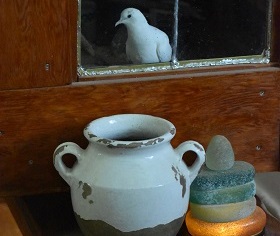

When there was assault made both of the Gentiles and also of the Jews with their rulers, to put them to shame and to stone them, they were aware of it, and fled unto Lystra and Derbe, cities of Lycaonia, and unto the region that lies round about, and there preached the gospel. And there sat a certain man at Lystra weak in his feet, being cripple from his mother’s womb, and never walked. The same heard Paul preach. Which beheld him and perceived that he had faith to be whole, and said with a loud voice: stand upright on thy feet. And he started up, and walked. And when the people saw what Paul had done, they lifted up their voices, saying in the speech of Lycaonia: gods are come down to us in the likeness of men. And they called Barnabas Jupiter, and Paul Mercury, because he was the preacher. Then Jupiter’s priest, which dwelt before their city, brought oxen and garlands unto the church porch, and would have done sacrifice with the people.
But when the apostles, Barnabas and Paul heard that, they rent their clothes, and ran in among the people, crying and saying: sirs, why do you this? We are mortal men like unto you, and preach unto you, that you should turn from these vanities unto the living God, which made heaven and earth and the sea and all that in them is: the which in times past suffered all nations to walk in their own ways. Nevertheless he left not himself without witness, in that he showed his benefits, in giving us rain from heaven and fruitful seasons, filling our hearts with food and gladness. And with these sayings, scarce refrained they the people, that they had not done sacrifice unto them. (Acts 14)
Ovid tells the story of an aged and pious couple of that region, Philemon and Baucis by name, who entertained Jupiter and Mercury (the Roman equivalents of Zeus and Hermes) unawares, and were rewarded for their hospitality (Metamorphoses viii. 626ff.). But in more recent times the evidence of epigraphy has effectively supplemented that of classical legend. Of two inscriptions from Sedasa, Near Lystra, dating from the middle of the third century, and discovered by Professor W. M. Calder, one records the dedication to Zeus of a statue of Hermes by men with Lycaonian names; the other mentions “priests of Zeus”. Another indication of the joint worship of Zeus and Hermes in those parts is provided by a stone altar discovered near Lystra by Professor Calder and Professor W. H. Buckler in 1926, dedicated to the “Hearer of Prayer” (presumably Zeus) and Hermes.
Zeus was the chief god in the Greek pantheon; Hermes, son of Zeus by Maia, was the herald of the gods. Barnabas may have been identified with Zeus because of his more dignified bearing; Paul, the more animated of the two, was called Hermes “because he was the chief speaker” –a very similar expression is used of Hermes by the early forth-century Neoplatonist writer Lamblichus when describing the Egyptian mysteries.
Commentary on the Book of The Acts; The English Text with Introduction, Exposition and Notes; By F. F. Bruce; Wm. B. Eerdmans Publishing Co.; Grand Rapids, Michigan

Since the part of the country where the little newsboy grew up was so sparsely populated his hometown held the important distinction of being the state’s second largest city, even with its relatively small population. Of course, the city’s small downtown area had no tinsel and glamour of large city life with its daily inhabitants among the tall skyscrapers and night-time flood of neon lights. But it did have steep hillsides and lofty mountains, though, to take their place. Nestled in a long and widening valley of the Rocky Mountains, the city was just the right size to make it possible for a young boy to ride his bike to any city park or child’s attraction, even if it was across town. The neighborhood where he lived included a large portion of the city and he knew by heart the names of most of the streets in it. Riding a bicycle or walking was his most frequent form of transportation. And, even while he was small and depended on others to take him places, he could still have close to home adventures.
Main Street, on the edge of the downtown business center, had a place that in its own special way made up for the small city’s insignificant hustle and bustle. It was an old-fashioned Dairy Queen located on the first floor of a two or three story building up next to adjoining sidewalks right on the street intersection. The main entrance had an open vestibule area, and, on the inside wall, a sliding window where they took orders and served, among other items on the menu, ice-cream cones. A large round column filled the corner of the open area by the intersection. One of the greatest times he had was going there with his family and friends for a nickel ice-cream cone.
A few blocks farther down the street, and, on the other side, the Coca Cola Bottling Company constructed a building with a large room that also had big picture windows. Indeed, two sides of the showcased room were all picture windows. These windows opened the rebottling plant and its machines into the view of passers-by. Many people of the small city came there, like this one family of the little newsboy, and stood up close to watch and clearly see how the reused (but sterilized) bottles made their way in close succession around the mechanical conveyor track. There they were refilled quickly one by one, capped, and packaged, all in a way that was intriguing for a little boy to watch.
On the way back home from there, (still on Main Street) there was another noticeable, but disturbing, building with a picture window. That is, it was disturbing to a young boy not used to that kind of novelty in architecture. The window frame was built in a way so that it had a steep slope—not outward, but inward into the building. At the bottom of the picture window was a flower bed with its outer side being part of the front wall. This appearance gave him an uncomfortable feeling.
As he grew older, he could sometimes go downtown on his own. Near the center of downtown there was a Woolworth’s five and dime store that had a long counter where he could buy a frozen mug filled to overflowing with root beer—all for just a nickel. Then as he grew even older and earned his own money, he could buy himself a Rocky Road ice cream cone (for a higher price) at the Hallowell Drug store on the other side of downtown. Just across the street from the drug store was the gray stone block post office. This building had federal offices and military recruiting offices on the upper floor, and even had an elevator. There were no escalators anywhere.
Then too, amidst his growing up years, this modern age of increasing innovation and invention, with its inherent risks, would hold most-certain danger for a young boy. The invention of pedestrian signals finally arrived at the little town. It brought with it a regulation whereby the little newsboy simply could not understand its purpose. There, while the old familiar traffic light was showing its green signal to proceed, the new traffic signal for pedestrians lighted up with the warning “Don’t Walk.” This contradiction of signals confused him. He knew that he was supposed to follow the sign for pedestrians but the contradiction, lack of understanding, and longer wait made it difficult.
One time, in a hurry and deciding to disregard what he could not understand, the little newsboy ignored the traffic signal’s confusing new set of rules and ran out into the street to take his chance on beating the red light. Into the street filled with traffic at that evening hour of the day he ran. Just barely into the street he was struck by a car as he ran into its path. The driver immediately got out of his car and came to the little newsboy. The boy then stood up, on his own, and, resisting the unwanted attention, kept insisting, “I’m okay.” Meanwhile, it was probably someone else in one of the businesses nearby that had called in a report to the police. Anyway, the police car was quickly there and parked kitty-corner across the street. The boy was taken to the police car. The police officer made sure he was indeed okay by making a minimal sort of examination of the most general areas where an injury could occur.
Afterwards the driver of the car who collided with the little newsboy asked, “Can I give you a ride home?” (This perhaps allowed him to have the opportunity to speak with the boy’s parents if perhaps he felt, after seeing his home and knowing the condition of his family, it would be necessary.) The little newsboy’s home was only a few blocks away and the driver dropped off the little boy to go inside of the old house with the bare dirt yard, all alone.
The Christmas story for the little newsboy of our introduction begins with a neighboring family and a member of that family, the friend of this little newsboy’s oldest brother. Their house was one of the city’s few luxurious homes, especially on the inside, and was nestled in the neighborhood among homes of a variety of conditions, as only would happen in a small city. The large brick home had the luxury of a specially constructed room in the basement (or garage), set aside exclusively for a fully designed and elaborately constructed train set. Entering through the back door, as the children would usually do, the home’s main floor, off from the kitchen, had an activity room with a cable TV and a better selection of channels to watch Saturday morning cartoon shows on than what the little newsboy was used to watching. These were about the only rooms the little newsboy saw in the home of the wealthy family who, like many other rich families of the city, were hospitable and generous to other, poor families.
The parents owned an iron salvage warehouse that also had a store in the front where they sold deer hide leather goods and colorfully beaded attire and, in turn, bought deer hides and other animal skins and furs from hunters and trappers. This industry provided the profits that resulted in their having a wonderfully nice home and notoriety in the community. The little newsboy thought it was unusual that his brother should gain the friendship of one from such a family, but then again there were other times that his brother surprised him.
One of those other times was when his oldest brother was in the third grade and the little newsboy was not yet in school. It was then that the older brother brought the little newsboy with him to his classroom at the elementary school to participate in his class party. This opened up the opportunity for an entirely new type of adventure for the little newsboy who received this most unusual invitation from his brother.
At some point in time the older brother received a beneficent gift from his friend who lived in the luxurious home. The youthful son of the rich parents of that family at one time happened to give one of his coats to his friend, the little newsboy’s older brother. It was a beautiful coat of fleece-like material with various and bright colors. Later, his brother, after he had outgrown it, handed down the coat to this little newsboy.
Somehow, at some point in time, the little newsboy discovered how he could pick up a stack of papers from the nearby journal office and sell them on the street corners downtown. The little newsboy would take a stack of papers and after an hour or two would return to the journal office with the change from selling his papers. He turned in the papers that were left over and paid back the newspaper office a nickel for every paper he sold at the price of a dime. That was how he bought the Rocky Road ice-cream cones at the Hallowell Drug store.
As wintertime progressed and Christmastime grew near the little newsboy thought of using his earnings to buy Christmas presents for his family. It was also at this time that he came to notice an alarming mystery, of course, concerning his earnings. Throughout the span of several days’ time, he would carry the standard number of papers to sell. As he sold the papers, he would keep from spending any of the change along the way as he sometimes did. By not spending his money for small things he could save up for Christmas. Yet still when he returned to the newspaper office for some unknown reason, he would only have about enough change to pay what he owed and very little to keep for himself and save for Christmas. There was no explanation he could think of.
About when he was out of time the explanation came to him, along with all the lost change. As he was walking along with his hands in his pockets on his way back to the journal office his finger protruded through a small hole. Now filled with understanding, he pulled the multi-colored fleece coat off. His investigation brought about the discovery of where his lost coins had disappeared to. They were all there in the coat’s lining where they had sifted through that small hole. He retrieved the coins and held the money in his hand. Joyfully he hurried down the street to the Bonanza 88 Cent store located a couple of blocks away, on Center Street. For a couple of dollars and some cents amounting to an increment of eighty-eight cents he bought a nice jewelry box for his oldest sister. Giving that gift was one of the best events and most joyful ones of that Christmas so long ago.
Then resorted unto him all the publicans and sinners, in order to hear him. And the Pharisees and scribes murmured saying: He received to his company sinners, and eats with them. Then put he forth this similitude to them saying: What man of you having an hundred sheep, if he lose one of them, does not leave ninety and nine in the wilderness, and go after that which is lost, until he find him? And when he has found him, he puts him on his shoulders with joy: And as soon as he comes home, he calls together his loved ones and neighbors saying to them: rejoice with me, for I have found my sheep which was lost. I say to you, that likewise joy shall be in heaven over one sinner that repents, more than over ninety and nine just persons, which need no repentance. Or what woman having ten grotes, if she loose one, does not light a candle, and sweep the house, and seek diligently, till she find it? And when she has found it she calls her loved ones and her neighbors saying: Rejoice with me, for I have found the groate which I had lost. Likewise I say to you, joy is made in the presence of the angels of God over one sinner that repents. (Luke 15)
Then he came to himself and said: how many hired servants at my fathers, have bread enough, and I die for hunger. I will arise, and go to my father and will say to him: father, I have sinned against heaven and before you, and am no more worthy to be called your son, make me as one of your hired servants. And he arose and went to his father. And when he was yet a great way off, his father saw him and had compassion, and ran and fell on his neck, and kissed him. And the son said to him: father, I have sinned against heaven, and in your sight, and am no more worthy to be called your son. But his father said to his servants: bring forth that best garment and put it on him, and put a ring on his hand, and shoes on his feet. And bring hither that fatted calf, and kill him, and let us eat and be merry: for this my son was dead, and is alive again, he was lost, and is now found. And they began to be merry.(Luke 15)
And Zacchaeus stood forth and said to the Lord: behold Lord, the half of my goods I give to the poor, and if I have done any man wrong, I will restore him fourfold. And Jesus said to him: this day is health come unto this house, forasmuch as it also is become the child of Abraham. For the Son of man is come to seek and to save that which was lost. (Luke 19)


“How much did the pitcher hold?” asked Sweet Fern.
“It did not hold quite a quart,” answered the student, “but you might keep pouring milk out of it till you should fill a hogshead if you pleased. The truth is, it would run on forever and not be dry even at midsummer; which is more than can be said of yonder rill that goes babbling down the hillside.”
“And what has become of the pitcher now?” inquired the little boy.
“It was broken, I am sorry to say, about twenty-five thousand years ago,” replied Cousin Eustace, “The people mended it as well as they could, but, though it would hold milk pretty well, it was never afterward known to fill itself of its own accord. So, you see, it was no better than any other cracked earthen pitcher.”
“What a pity!” cried all the children at once.
The respectable dog Ben had accompanied the party, as did likewise a half-grown New foundland puppy who went by the name of Bruin, because he was just as black as a bear. Ben, being elderly and of very circumspect habits, was respectfully requested by Cousin Eustace to stay behind with the four little children, in order to keep them out of mischief. As for black Bruin, who was himself nothing but a child, the student thought it best to take him along, lest in his rude play with the other children he should trip them up and send them rolling and tumbling down the hill. Advising Cowslip, Sweet Fern, Dandelion and Squash-blossom to sit pretty still in the spot where he left them, the student, with Primrose and the elder children, began to ascend, and were soon out of sight among the trees.


